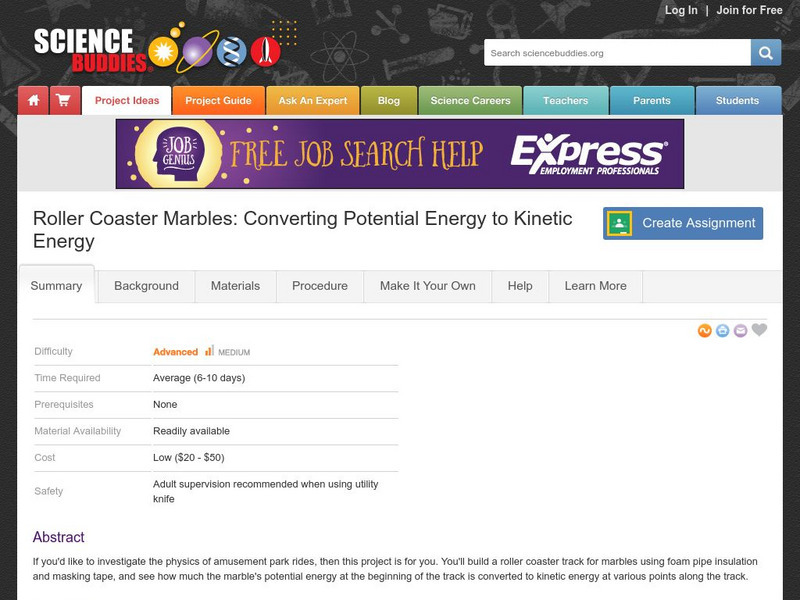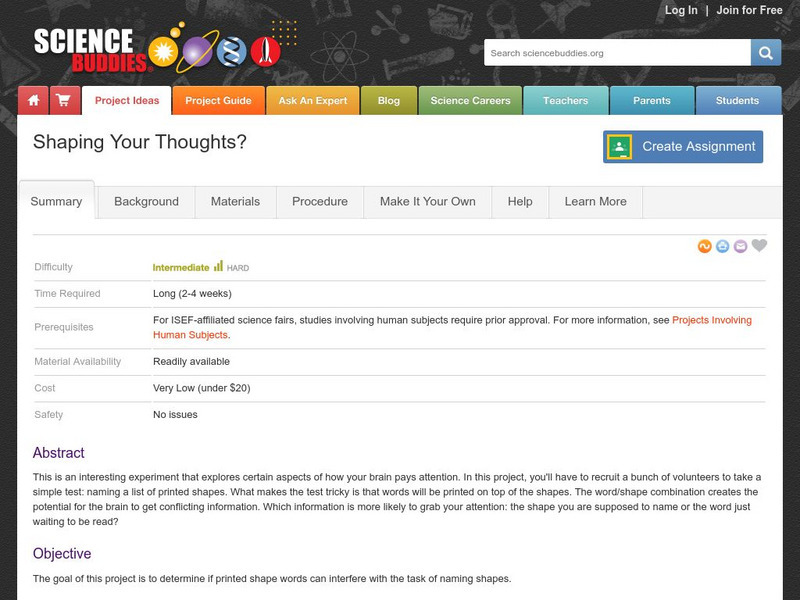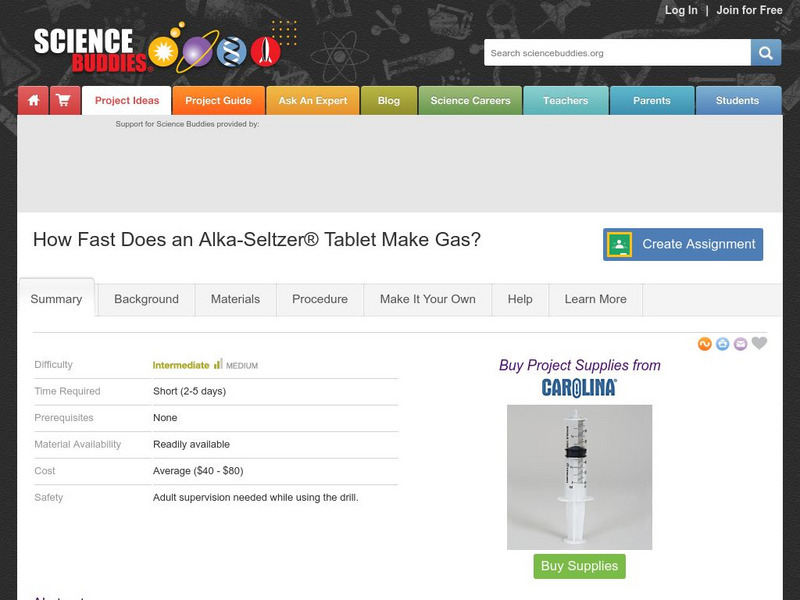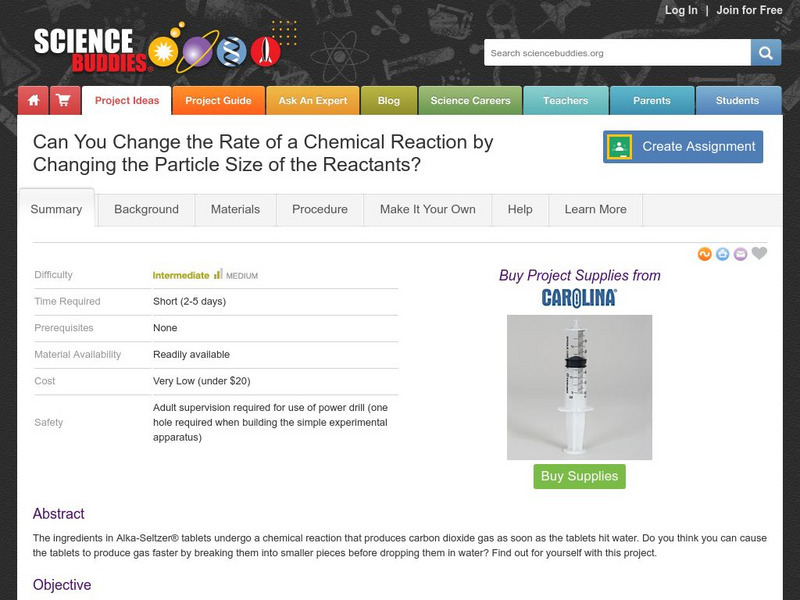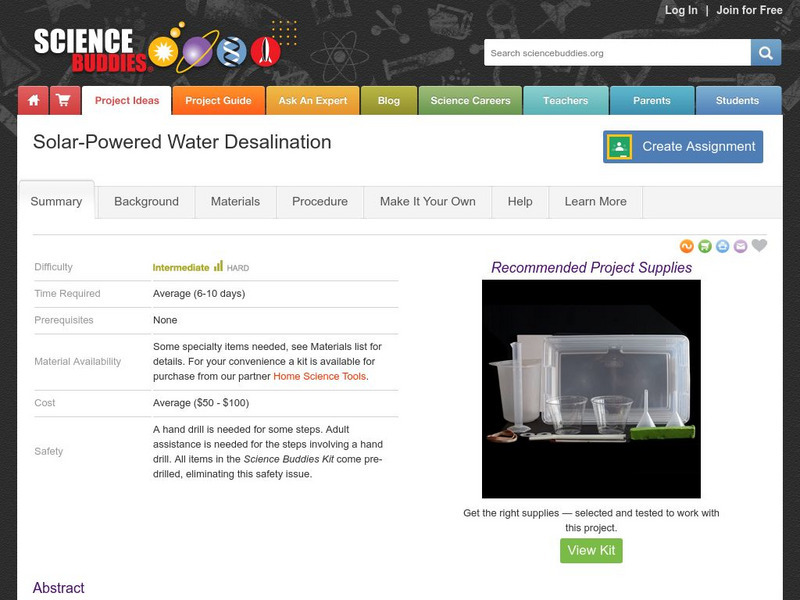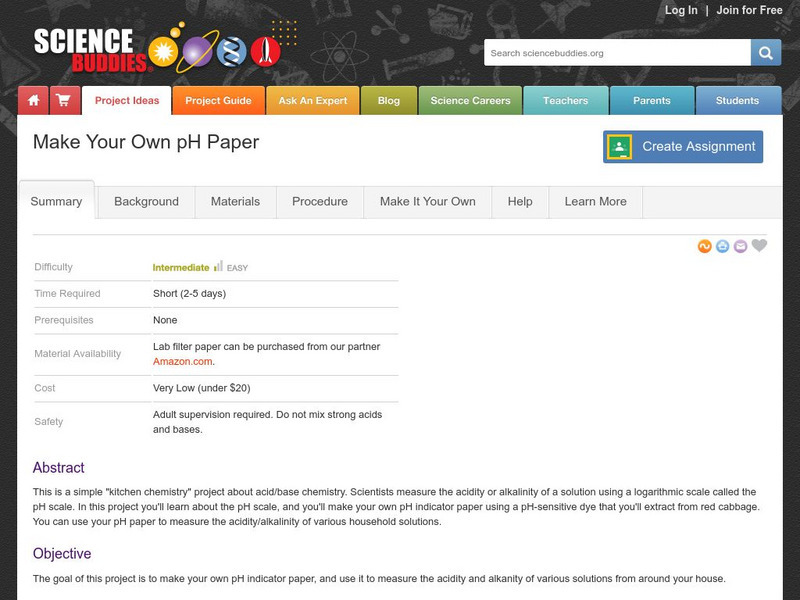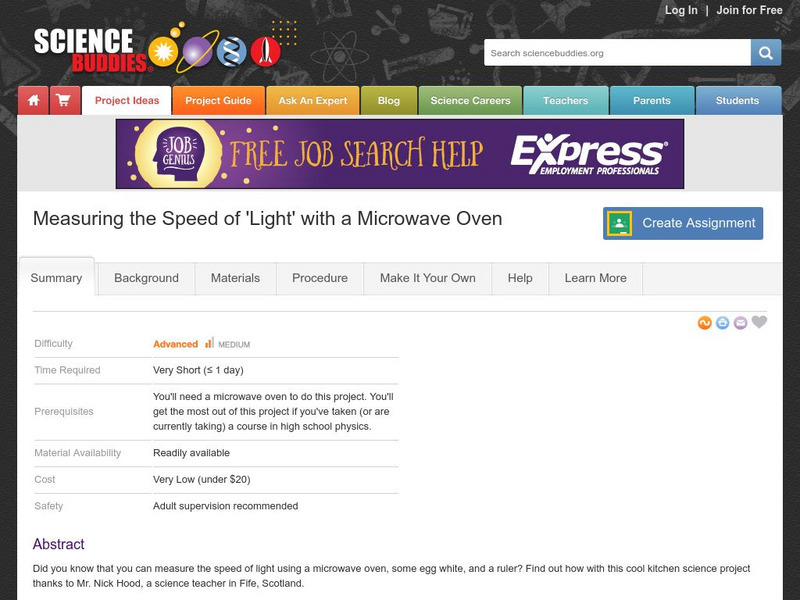Science Buddies
Science Buddies: Balancing Act: Finding Your Center of Gravity
Like to have the balance of a tightrope walker? Try the more close - to - the - ground balancing test in this easy experiment to learn a few trade secrets of the high wire experts. In this project, you'll find your center of gravity and...
Science Buddies
Science Buddies: How Does Packaging Affect the Ripening of Fruit?
Why do different types of fruits come packaged in different ways? In this project, you will experiment with different ways of packaging fruit to see if it has an effect on the freshness of the fruit. Will a different kind of packaging...
Science Buddies
Science Buddies: Roller Coaster Marbles: How Much Height to Loop the Loop?
This is a really fun project even if you don't like going on roller coasters yourself. You'll build a roller coaster track for marbles using foam pipe insulation and masking tape, and see how much of an initial drop is required to get...
Science Buddies
Science Buddies: Dog Scents: The Super Nose of Man's Best Friend
Everyone thinks their dog's the best, but in the case of smelling ability, all dogs possess super powers. In fact, a dog's nose can be over a 1,000 times more sensitive than a human's. In this project, learn about smell from a dog's...
Science Buddies
Science Buddies: Converting Potential Energy to Kinetic Energy
If you'd like to investigate the physics of amusement park rides, then this project is for you. You'll build a roller coaster track for marbles using foam pipe insulation and masking tape, and see how much the marble's potential energy...
Science Buddies
Science Buddies: Tightening the Turns in Speed Skating
Fast turns around the track can become your laboratory tests in these experiments, whether you skate on ice, wood, or pavement. The goal is to determine which type of turns are best in a race - tight, medium, or wide - and then to figure...
Science Buddies
Science Buddies: Shaping Your Thoughts?
This is an experiment that explores certain aspects of how your brain pays attention. In this project, you'll have to recruit volunteers to take a simple test: naming a list of printed shapes. What makes the test tricky is that words...
Science Buddies
Science Buddies: Warped Words and the Stroop Effect
The Stroop effect describes an experiment about the time it takes to name the color of printed words. When you try to name the color in which color words are printed, it takes longer when the color word differs from the ink color than...
Science Buddies
Science Buddies: How Fast Does an Alka Seltzer Tablet Make Gas?
This is a straightforward, fun project to measure the rate of the chemical reaction that occurs when Alka-Seltzer tablets are plopped into water. You'll track the volume of carbon dioxide gas produced at regular intervals after the...
Science Buddies
Science Buddies: Locating an Earthquake Using a Global Seismic Network
When an earthquake happens, how are scientists able to determine the original location of the quake? In this project, you'll use archived data from a global network of seismometers to find out for yourself. You will make your own...
Science Buddies
Science Buddies: Can You Change the Rate of a Chemical Reaction?
The ingredients in Alka-Seltzer tablets undergo a chemical reaction that produces carbon dioxide gas as soon as the tablets hit water. Do you think you can cause the tablets to produce gas faster by breaking them into smaller pieces...
Science Buddies
Science Buddies: Measuring the Earth's Core With Seismic Waves
When an earthquake occurs, seismic shock waves travel out through the earth from the source of the event. The shock waves travel through the earth (body waves), or along the Earth's surface (surface waves), and can be recorded at remote...
Science Buddies
Science Buddies: Testing Ant Repellents
Has your house ever suffered an ant invasion? This project is an interesting way to investigate what substances are effective as ant repellents. The goal is to find substances that keep ants away, yet are safe for humans and the...
Science Buddies
Science Buddies: Do Milkweed Bugs Show a Color Preference for Egg Laying Sites?
Milkweed bugs, as their name suggests, have a close relationship with the milkweed plant. The plant produces a milky sap, and toxic compounds, but somehow the milkweed bug is unaffected by them. Instead, it concentrates chemicals from...
Science Buddies
Science Buddies: What Seeds Do Birds Prefer to Eat?
In this project you'll build a bird feeding platform with four separate feeding areas. You'll be able to observe birds at close range, find out what birds inhabit your area, and learn about their seed-eating preferences. So get out your...
Science Buddies
Science Buddies: Applying Hooke's Law: Make Your Own Spring Scale
Hooke's law says that the opposing force of a spring is directly proportional to the amount by which the spring is stretched. How accurately Hooke's law describe the behavior of real springs? Can springs be used to make accurate scales...
Science Buddies
Science Buddies: Beach Bum Science: Compression of Wet Sand
Did you ever notice the cool patterns around your footprints when you take a walk in the wet sand at the beach? The pressure of your feet has effects far outside your footprints. Here's a project that uses a simple experimental apparatus...
Science Buddies
Science Buddies: Under Pressure: Sand Under Lateral Compression
Here's a project that involves a different kind of sandbox than the ones you usually think of. This one has a moving wall inside, acting like a piston, to compress the sand. You can make layers using two different colors of sand, and...
Science Buddies
Science Buddies: Solar Powered Water Desalination
Here is a cool project about making fresh water from salt water using solar power, also known as water desalination. The apparatus is made from readily available materials, and the power source is free. As an inventive thinker, you will...
Science Buddies
Science Buddies: Make Your Own P H Paper
In this "kitchen chemistry" project about acid/base chemistry, you will measure the acidity or alkalinity of a solution using a logarithmic scale called the pH scale. As you learn about the pH scale, you will have the chance to make your...
Science Buddies
Science Buddies: What Is the Maximum Intermediate Height for a Siphon?
If you have ever had a fish tank, you have owned an operating siphon. A siphon is a handy device for emptying out a liquid reservoir that has no drain. As a result, they are great for cleaning fish tanks. Liquid in a siphon flows...
Science Buddies
Science Buddies: Measuring the Speed of 'Light' With a Microwave Oven
In this experiment, you will measure the speed of light using a microwave oven, some egg white, and a ruler. This short project proves to be an extremely interesting choice for a science lab, with pictures for illustration, and thorough...
Science Buddies
Science Buddies: Tiling With Spidrons
If art and math are both passions of yours, this project is meant for you! Spidrons are geometric forms made from alternating sequences of equilateral and isosceles (30 degrees, 30 degrees, 120 degrees) triangles. Spidrons were...
Science Buddies
Science Buddies: Honesty: How Prevalent Is It?
This project explores how well the honor system works for a bake sale-type charity donation. Find out if people are actually capable of honesty, or if they are only honest when they think someone is watching.






